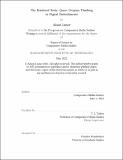| dc.contributor.advisor | Taylor, T. L. | |
| dc.contributor.author | Lanier, Alison | |
| dc.date.accessioned | 2022-08-29T15:53:12Z | |
| dc.date.available | 2022-08-29T15:53:12Z | |
| dc.date.issued | 2022-05 | |
| dc.date.submitted | 2022-05-25T13:53:27.781Z | |
| dc.identifier.uri | https://hdl.handle.net/1721.1/144522 | |
| dc.description.abstract | The rendered body is pure possibility, but it has been treated with an imaginatively limited lens that belies its potential for radical reimagining. I want to challenge those imaginative limits, especially in regard to gender and how gender is read on digital bodies. In order to do this, I will draw on video games studies' rich field of avatar and body theory, queer theory's concepts of gender instability and failure, animation's tools of abstraction and imagination, and sf studies' figuring of radical possibility. | |
| dc.publisher | Massachusetts Institute of Technology | |
| dc.rights | In Copyright - Educational Use Permitted | |
| dc.rights | Copyright retained by author(s) | |
| dc.rights.uri | https://rightsstatements.org/page/InC-EDU/1.0/ | |
| dc.title | The Rendered Body: Queer Utopian Thinking in Digital Embodiment | |
| dc.type | Thesis | |
| dc.description.degree | S.M. | |
| dc.contributor.department | Massachusetts Institute of Technology. Program in Comparative Media Studies/Writing | |
| mit.thesis.degree | Master | |
| thesis.degree.name | Master of Science in Comparative Media Studies | |
